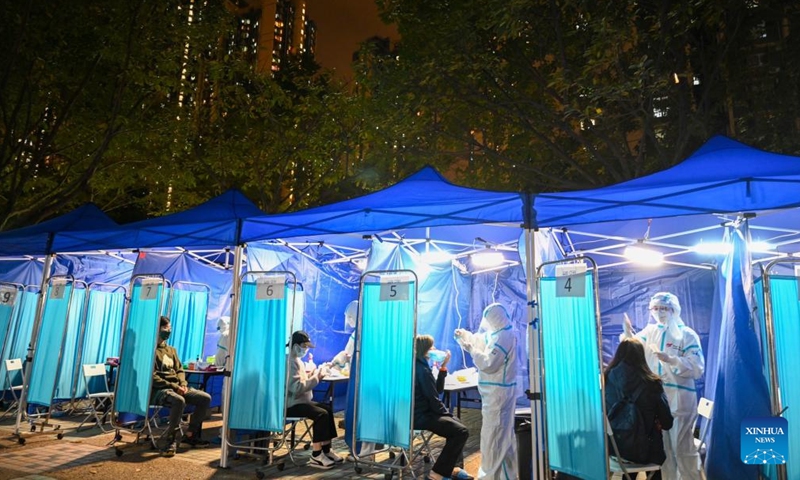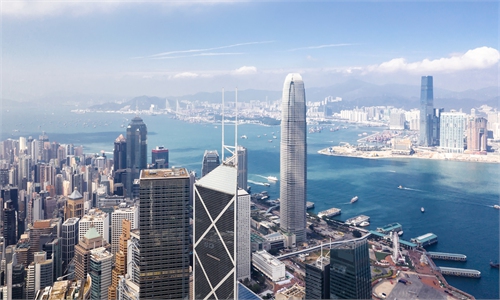
Residents take COVID-19 tests in Kwai Chung of Hong Kong, south China, Jan. 23, 2022. Hong Kong reported 140 new cases of COVID-19 over the past 24 hours on Sunday, taking the total tally to 13,286, according to data from the Center for Health Protection.Photo:Xinhua
Amid new cluster outbreaks in Hong Kong, Carrie Lam, the chief executive of the Hong Kong Special Administrative Region, vowed to push forward a vaccine bubble plan and mass vaccination. With a daily testing capacity that can increase to 150,000, Lam said she remained open to assistance from the Chinese mainland when asked by reporters during a weekly briefing on Tuesday. Hong Kong's neighboring city Shenzhen in South China's Guangdong also beefed up epidemic control measures in requiring arrivals from Hong Kong to undergo strict 14 plus 7 quarantine measures.Hong Kong recorded over 100 new COVID-19 cases for a third consecutive day on Monday as local authorities locked down some residential compounds in the Kwai Chung area to curb the spread and imposed measures such as asking some employees to work from home, and city-wide restrictions as well as mandatory testing.
The city's daily testing capacity is about 100,000, which can reach as much as 150,000, Lam told the briefing, noting that the government is now working on the sustainability of the plan. "If we need help, we'll ask for it from the mainland. The central government is very concerned about the epidemic in Hong Kong," she said, noting that Hong Kong and the mainland are "one family."
Lam also noted that the local government in South China's Guangdong already proposed to the HKSAR government that if the city needs help, Guangdong is ready.
Considering the epidemic situation in Hong Kong, a number of lawmakers started an online petition on Sunday asking to streamline the lockdown procedures, expanding testing space, enhancing the itinerary tracking to trace the origins and transmission routes, and also urged help from the central government in reserving special medicines for Hong Kong.
Hong Kong legislator Junius Ho Kwan-yiu, who also took part in the petition, told the Global Times on Monday night that from the incident that a Cathay Pacific crew did not follow anti-epidemic rules which triggered the community outbreak, local residents have become nervous. "Although the HKSAR government has taken a number of measures in curbing the spread, it's been two years now, and we have much to learn from the mainland's experiences," he said.
Ho noted that a major reason for Hong Kong not conducting full-scale nucleic acid testing is due to the so-called concerns that a lockdown and restrictions may hurt the city's open economy.
"If we lock down a few days to contain the epidemic, the losses would be much less than the prolonged epidemic fight without decisive measures," he said.
Some experts said that the shortage of staff and equipment make it difficult to reach full-scale testing. "We can learn from mainland cities. For example, our neighboring city Shenzhen has conducted full-scale testing in several districts in a very short period of time. If we need assistance, we should ask for it," he said.
The central government already offered help to Hong Kong in 2020 including enhancing testing capacity, building makeshift shelter hospitals and providing vaccines. In August 2020, the central government dispatched nucleic acid testing groups to support the anti-epidemic work, and helped the HKSAR government build temporary labs and temporary treatment facilities in the AsiaWorld-Expo to treat patients with mild symptoms.
Given the COVID-19 flare-up in Hong Kong, the Shenzhen port stepped up epidemic control measures by requiring all arrivals from Hong Kong to undergo 14 days of collective quarantine with a seven-day home medical observation, instead of the previous seven days of quarantine with seven days of home quarantine, and seven days of health observation.
The new rules will start on Wednesday.


